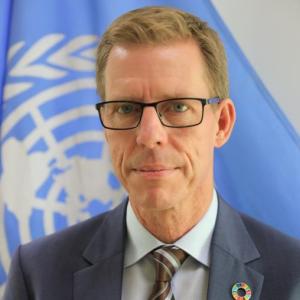Excellencies,
Distinguished guests,
Ladies and Gentlemen, and
Colleagues
Thank you, all, for joining us today to commemorate World Humanitarian Day.
We come together to honour humanitarian workers around the world who are risking their lives every day to serve the humanitarian cause. We also pay tribute to all humanitarian workers who have lost their lives while on the front lines of war and disasters. We honor the commitment, bravery and sacrifice of humanitarian aid workers who contribute every day to saving lives and upholding the dignity of peoplen in crises.
To begin, I propose a minute of silence to pay tribute to the humanitarian workers around the world who have lost their lives while carrying out their duties.
Colleagues,
It is our shared commitment to the millions of vulnerable girls, boys, women and men who rely on life-saving assistance and protection for their survival, that brings us together. It is in this spirit of service that we celebrate today.
World Humanitarian Day was established on the anniversary of the 2003 bombing of the UN Headquarters in Baghdad in which 22 of our colleagues lost their lives. Globally, this year, the UN and its partners advocate for the protection of civilians and aid workers in all conflicts and disasters. The content and findings of the UN Secretary-General Antonio Guterres’ 2017 Report on the Protection of Civilians provides the basics for this focus.
A humanitarian worker is not only the person handing out assistance to people in need. Humanitarian workers are doctors, teachers, psychologists, as well as support workers – the drivers, clerks and others who help make sure humanitarian action is timely and effective and addresses the specific needs of those affected by disasters and conflict.
This year, we pay special tribute to women humanitarians and their tremendous contribution to humanitarian action.
In his message to mark International Women's Day, United Nations Secretary-General António Guterres stressed that women empowerment, gender equality and inclusion are “essential to global progress”. He called for greater ambition and scalable action to achieve the Sustainable Development Goals by 2030.
Today, the world faces multiple crises: violent conflict, natural hazards, climate induced displacement and growing poverty. This challenges our work and the indeed, the future of the world as we know it. Alongside the impacts of the ever more complex emergencies, inequality continues to undermine social cohesion, human rights, peace and prosperity. For these reasons, the 2030 Agenda places the goals of inclusion, empowerment, equality and leaving no one behind at the heart of our efforts to reduce needs and vulnerability. Working together we strive to promote a world of peace, dignity and equality.
Ladies and gentleman, I take this opportunity to both acknowledge and express sincere gratitude for the immense hospitality of the people and Government of Jordan. They have demonstrated generosity and flexibility in receiving and addressing the needs of vulnerable Syrians and other refugees. We recognize the pressure this has placed on Jordan’s infrastructure and social systems. Jordan can be proud of its long history of opening its doors to people fleeing conflict and offering a safe haven to those who need it most. Jordan is a role model both in the region and in the world. This includes the leading role many Jordanian women play in delivering assistance and supporting others.
As we commemorate World Humanitarian Day, the UN family in Jordan reiterates its commitment to support the country in advancing gender equality and women empowerment, including by strengthening their participation in humanitarian as well as other leadership roles. For the United Nations, this means supporting the country in accelerating its work on the Sustainable Development Goals.
Ladies and gentleman, let our voices be united to demand more action politically and programmatically to uphold international humanitarian law and principles that guide our humanitarian work. Let us speak louder and work more closely together so that we can meet immediate humanitarian needs while at the same time working to achieve longer-term, sustainable solutions.
Thank you for being here with us today.



